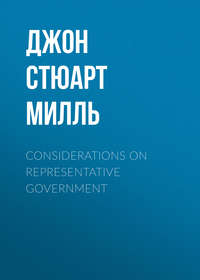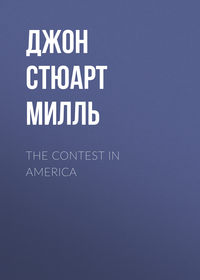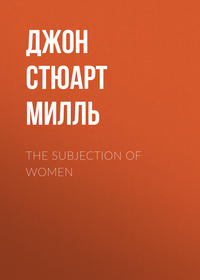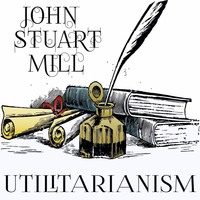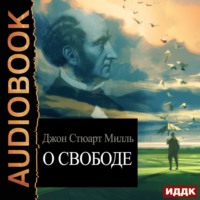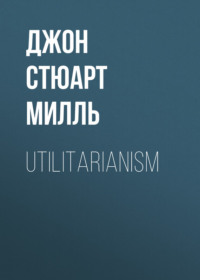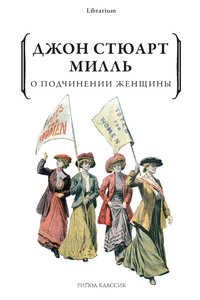 полная версия
полная версияAutobiography
The time occupied in this editorial work was extremely well employed in respect to my own improvement. The Rationale of Judicial Evidence is one of the richest in matter of all Bentham's productions. The theory of evidence being in itself one of the most important of his subjects, and ramifying into most of the others, the book contains, very fully developed, a great proportion of all his best thoughts: while, among more special things, it comprises the most elaborate exposure of the vices and defects of English law, as it then was, which is to be found in his works; not confined to the law of evidence, but including, by way of illustrative episode, the entire procedure or practice of Westminster Hall. The direct knowledge, therefore, which I obtained from the book, and which was imprinted upon me much more thoroughly than it could have been by mere reading, was itself no small acquisition. But this occupation did for me what might seem less to be expected; it gave a great start to my powers of composition. Everything which I wrote subsequently to this editorial employment, was markedly superior to anything that I had written before it. Bentham's later style, as the world knows, was heavy and cumbersome, from the excess of a good quality, the love of precision, which made him introduce clause within clause into the heart of every sentence, that the reader might receive into his mind all the modifications and qualifications simultaneously with the main proposition: and the habit grew on him until his sentences became, to those not accustomed to them, most laborious reading. But his earlier style, that of the Fragment on Government, Plan of a Judicial Establishment, etc., is a model of liveliness and ease combined with fulness of matter, scarcely ever surpassed: and of this earlier style there were many striking specimens in the manuscripts on Evidence, all of which I endeavoured to preserve. So long a course of this admirable writing had a considerable effect upon my own; and I added to it by the assiduous reading of other writers, both French and English, who combined, in a remarkable degree, ease with force, such as Goldsmith, Fielding, Pascal, Voltaire, and Courier. Through these influences my writing lost the jejuneness of my early compositions; the bones and cartilages began to clothe themselves with flesh, and the style became, at times, lively and almost light.
This improvement was first exhibited in a new field. Mr. Marshall, of Leeds, father of the present generation of Marshalls, the same who was brought into Parliament for Yorkshire, when the representation forfeited by Grampound was transferred to it, an earnest Parliamentary reformer, and a man of large fortune, of which he made a liberal use, had been much struck with Bentham's Book of Fallacies; and the thought had occurred to him that it would be useful to publish annually the Parliamentary Debates, not in the chronological order of Hansard, but classified according to subjects, and accompanied by a commentary pointing out the fallacies of the speakers. With this intention, he very naturally addressed himself to the editor of the Book of Fallacies; and Bingham, with the assistance of Charles Austin, undertook the editorship. The work was called Parliamentary History and Review. Its sale was not sufficient to keep it in existence, and it only lasted three years. It excited, however, some attention among parliamentary and political people. The best strength of the party was put forth in it; and its execution did them much more credit than that of the Westminster Review had ever done. Bingham and Charles Austin wrote much in it; as did Strutt, Romilly, and several other Liberal lawyers. My father wrote one article in his best style; the elder Austin another. Coulson wrote one of great merit. It fell to my lot to lead off the first number by an article on the principal topic of the session (that of 1825), the Catholic Association and the Catholic Disabilities. In the second number I wrote an elaborate Essay on the Commercial Crisis of 1825 and the Currency Debates. In the third I had two articles, one on a minor subject, the other on the Reciprocity principle in commerce, ŕ propos of a celebrated diplomatic correspondence between Canning and Gallatin. These writings were no longer mere reproductions and applications of the doctrines I had been taught; they were original thinking, as far as that name can be applied to old ideas in new forms and connexions: and I do not exceed the truth in saying that there was a maturity, and a well-digested, character about them, which there had not been in any of my previous performances. In execution, therefore, they were not at all juvenile; but their subjects have either gone by, or have been so much better treated since, that they are entirely superseded, and should remain buried in the same oblivion with my contributions to the first dynasty of the Westminster Review.
While thus engaged in writing for the public, I did not neglect other modes of self-cultivation. It was at this time that I learnt German; beginning it on the Hamiltonian method, for which purpose I and several of my companions formed a class. For several years from this period, our social studies assumed a shape which contributed very much to my mental progress. The idea occurred to us of carrying on, by reading and conversation, a joint study of several of the branches of science which we wished to be masters of. We assembled to the number of a dozen or more. Mr. Grote lent a room of his house in Threadneedle Street for the purpose, and his partner, Prescott, one of the three original members of the Utilitarian Society, made one among us. We met two mornings in every week, from half-past eight till ten, at which hour most of us were called off to our daily occupations. Our first subject was Political Economy. We chose some systematic treatise as our text-book; my father's Elements being our first choice. One of us read aloud a chapter, or some smaller portion of the book. The discussion was then opened, and anyone who had an objection, or other remark to make, made it. Our rule was to discuss thoroughly every point raised, whether great or small, prolonging the discussion until all who took part were satisfied with the conclusion they had individually arrived at; and to follow up every topic of collateral speculation which the chapter or the conversation suggested, never leaving it until we had untied every knot which we found. We repeatedly kept up the discussion of some one point for several weeks, thinking intently on it during the intervals of our meetings, and contriving solutions of the new difficulties which had risen up in the last morning's discussion. When we had finished in this way my father's Elements, we went in the same manner through Ricardo's Principles of Political Economy, and Bailey's Dissertation on Value. These close and vigorous discussions were not only improving in a high degree to those who took part in them, but brought out new views of some topics of abstract Political Economy. The theory of International Values which I afterwards published, emanated from these conversations, as did also the modified form of Ricardo's Theory of Profits, laid down in my Essay on Profits and Interest. Those among us with whom new speculations chiefly originated, were Ellis, Graham, and I; though others gave valuable aid to the discussions, especially Prescott and Roebuck, the one by his knowledge, the other by his dialectical acuteness. The theories of International Values and of Profits were excogitated and worked out in about equal proportions by myself and Graham: and if our original project had been executed, my Essays on Some Unsettled Questions of Political Economy would have been brought out along with some papers of his, under our joint names. But when my exposition came to be written, I found that I had so much over-estimated my agreement with him, and he dissented so much from the most original of the two Essays, that on International Values, that I was obliged to consider the theory as now exclusively mine, and it came out as such when published many years later. I may mention that among the alterations which my father made in revising his Elements for the third edition, several were founded on criticisms elicited by these conversations; and in particular he modified his opinions (though not to the extent of our new speculations) on both the points to which I have adverted.
When we had enough of political economy, we took up the syllogistic logic in the same manner, Grote now joining us. Our first text-book was Aldrich, but being disgusted with its superficiality, we reprinted one of the most finished among the many manuals of the school logic, which my father, a great collector of such books, possessed, the Manuductio ad Logicam of the Jesuit Du Trieu. After finishing this, we took up Whately's Logic, then first republished from the Encyclopedia Metropolitana, and finally the Computatio sive Logica of Hobbes. These books, dealt with in our manner, afforded a high range for original metaphysical speculation: and most of what has been done in the First Book of my System of Logic, to rationalize and correct the principles and distinctions of the school logicians, and to improve the theory of the Import of Propositions, had its origin in these discussions; Graham and I originating most of the novelties, while Grote and others furnished an excellent tribunal or test. From this time I formed the project of writing a book on Logic, though on a much humbler scale than the one I ultimately executed.
Having done with Logic, we launched into Analytic Psychology, and having chosen Hartley for our text-book, we raised Priestley's edition to an extravagant price by searching through London to furnish each of us with a copy. When we had finished Hartley, we suspended our meetings; but my father's Analysis of the Mind being published soon after, we reassembled for the purpose of reading it. With this our exercises ended. I have always dated from these conversations my own real inauguration as an original and independent thinker. It was also through them that I acquired, or very much strengthened, a mental habit to which I attribute all that I have ever done, or ever shall do, in speculation: that of never accepting half-solutions of difficulties as complete; never abandoning a puzzle, but again and again returning to it until it was cleared up; never allowing obscure corners of a subject to remain unexplored, because they did not appear important; never thinking that I perfectly understood any part of a subject until I understood the whole.
Our doings from 1825 to 1830 in the way of public speaking, filled a considerable place in my life during those years, and as they had important effects on my development, something ought to be said of them.
There was for some time in existence a society of Owenites, called the Co-operative Society, which met for weekly public discussions in Chancery Lane. In the early part of 1825, accident brought Roebuck in contact with several of its members, and led to his attending one or two of the meetings and taking part in the debate in opposition to Owenism. Some one of us started the notion of going there in a body and having a general battle: and Charles Austin and some of his friends who did not usually take part in our joint exercises, entered into the project. It was carried out by concert with the principal members of the Society, themselves nothing loth, as they naturally preferred a controversy with opponents to a tame discussion among their own body. The question of population was proposed as the subject of debate: Charles Austin led the case on our side with a brilliant speech, and the fight was kept up by adjournment through five or six weekly meetings before crowded auditories, including along with the members of the Society and their friends, many hearers and some speakers from the Inns of Court. When this debate was ended, another was commenced on the general merits of Owen's system: and the contest altogether lasted about three months. It was a lutte corps ŕ corps between Owenites and political economists, whom the Owenites regarded as their most inveterate opponents: but it was a perfectly friendly dispute. We who represented political economy, had the same objects in view as they had, and took pains to show it; and the principal champion on their side was a very estimable man, with whom I was well acquainted, Mr. William Thompson, of Cork, author of a book on the Distribution of Wealth, and of an " Appeal" in behalf of women against the passage relating to them in my father's Essay on Government. Ellis, Roebuck, and I took an active part in the debate, and among those from the Inns of Court who joined in it, I remember Charles Villiers. The other side obtained also, on the population question, very efficient support from without. The well-known Gale Jones, then an elderly man, made one of his florid speeches; but the speaker with whom I was most struck, though I dissented from nearly every word he said, was Thirlwall, the historian, since Bishop of St. David's, then a Chancery barrister, unknown except by a high reputation for eloquence acquired at the Cambridge Union before the era of Austin and Macaulay. His speech was in answer to one of mine. Before he had uttered ten sentences, I set him down as the best speaker I had ever heard, and I have never since heard anyone whom I placed above him.
The great interest of these debates predisposed some of those who took part in them, to catch at a suggestion thrown out by McCulloch, the political economist, that a Society was wanted in London similar to the Speculative Society at Edinburgh, in which Brougham, Horner, and others first cultivated public speaking. Our experience at the Co-operative Society seemed to give cause for being sanguine as to the sort of men who might be brought together in London for such a purpose. McCulloch mentioned the matter to several young men of influence, to whom he was then giving private lessons in political economy. Some of these entered warmly into the project, particularly George Villiers, after Earl of Clarendon. He and his brothers, Hyde and Charles, Romilly, Charles Austin and I, with some others, met and agreed on a plan. We determined to meet once a fortnight from November to June, at the Freemasons' Tavern, and we had soon a fine list of members, containing, along with several members of Parliament, nearly all the most noted speakers of the Cambridge Union and of the Oxford United Debating Society. It is curiously illustrative of the tendencies of the time, that our principal difficulty in recruiting for the Society was to find a sufficient number of Tory speakers. Almost all whom we could press into the service were Liberals, of different orders and degrees. Besides those already named, we had Macaulay, Thirlwall, Praed, Lord Howick, Samuel Wilberforce (afterwards Bishop of Oxford), Charles Poulett Thomson (afterwards Lord Sydenham), Edward and Henry Lytton Bulwer, Fonblanque, and many others whom I cannot now recollect, but who made themselves afterwards more or less conspicuous in public or literary life. Nothing could seem more promising. But when the time for action drew near, and it was necessary to fix on a President, and find somebody to open the first debate, none of our celebrities would consent to perform either office. Of the many who were pressed on the subject, the only one who could be prevailed on was a man of whom I knew very little, but who had taken high honours at Oxford and was said to have acquired a great oratorical reputation there; who some time afterwards became a Tory member of Parliament. He accordingly was fixed on, both for filling the President's chair and for making the first speech. The important day arrived; the benches were crowded; all our great speakers were present, to judge of, but not to help our efforts. The Oxford orator's speech was a complete failure. This threw a damp on the whole concern: the speakers who followed were few, and none of them did their best: the affair was a complete fiasco; and the oratorical celebrities we had counted on went away never to return, giving to me at least a lesson in knowledge of the world. This unexpected breakdown altered my whole relation to the project. I had not anticipated taking a prominent part, or speaking much or often, particularly at first, but I now saw that the success of the scheme depended on the new men, and I put my shoulder to the wheel. I opened the second question, and from that time spoke in nearly every debate. It was very uphill work for some time. The three Villiers and Romilly stuck to us for some time longer, but the patience of all the founders of the Society was at last exhausted, except me and Roebuck. In the season following, 1826-7, things began to mend. We had acquired two excellent Tory speakers, Hayward and Shee (afterwards Sergeant Shee): the Radical side was reinforced by Charles Buller, Cockburn, and others of the second generation of Cambridge Benthamities; and with their and other occasional aid, and the two Tories as well as Roebuck and me for regular speakers, almost every debate was a bataille rangée between the "philosophic Radicals" and the Tory lawyers; until our conflicts were talked about, and several persons of note and consideration came to hear us. This happened still more in the subsequent seasons, 1828 and 1829, when the Coleridgians, in the persons of Maurice and Sterling, made their appearance in the Society as a second Liberal and even Radical party, on totally different grounds from Benthamism and vehemently opposed to it; bringing into these discussions the general doctrines and modes of thought of the European reaction against the philosophy of the eighteenth century; and adding a third and very important belligerent party to our contests, which were now no bad exponent of the movement of opinion among the most cultivated part of the new generation. Our debates were very different from those of common debating societies, for they habitually consisted of the strongest arguments and most philosophic principles which either side was able to produce, thrown often into close and serré confutations of one another. The practice was necessarily very useful to us, and eminently so to me. I never, indeed, acquired real fluency, and had always a bad and ungraceful delivery; but I could make myself listened to: and as I always wrote my speeches when, from the feelings involved, or the nature of the ideas to be developed, expression seemed important, I greatly increased my power of effective writing; acquiring not only an ear for smoothness and rhythm, but a practical sense for telling sentences, and an immediate criterion of their telling property, by their effect on a mixed audience.
The Society, and the preparation for it, together with the preparation for the morning conversations which were going on simultaneously, occupied the greater part of my leisure; and made me feel it a relief when, in the spring of 1828, I ceased to write for the Westminster. The Review had fallen into difficulties. Though the sale of the first number had been very encouraging, the permanent sale had never, I believe, been sufficient to pay the expenses, on the scale on which the Review was carried on. Those expenses had been considerably, but not sufficiently, reduced. One of the editors, Southern, had resigned; and several of the writers, including my father and me, who had been paid like other contributors for our earlier articles, had latterly written without payment. Nevertheless, the original funds were nearly or quite exhausted, and if the Review was to be continued some new arrangement of its affairs had become indispensable. My father and I had several conferences with Bowring on the subject. We were willing to do our utmost for maintaining the Review as an organ of our opinions, but not under Bowring's editorship: while the impossibility of its any longer supporting a paid editor, afforded a ground on which, without affront to him, we could propose to dispense with his services. We and some of our friends were prepared to carry on the Review as unpaid writers, either finding among ourselves an unpaid editor, or sharing the editorship among us. But while this negotiation was proceeding with Bowring's apparent acquiescence, he was carrying on another in a different quarter (with Colonel Perronet Thompson), of which we received the first intimation in a letter from Bowring as editor, informing us merely that an arrangement had been made, and proposing to us to write for the next number, with promise of payment. We did not dispute Bowring's right to bring about, if he could, an arrangement more favourable to himself than the one we had proposed; but we thought the concealment which he had practised towards us, while seemingly entering into our own project, an affront: and even had we not thought so, we were indisposed to expend any more of our time and trouble in attempting to write up the Review under his management. Accordingly my father excused himself from writing; though two or three years later, on great pressure, he did write one more political article. As for me, I positively refused. And thus ended my connexion with the original Westminster. The last article which I wrote in it had cost me more labour than any previous; but it was a labour of love, being a defence of the early French Revolutionists against the Tory misrepresentations of Sir Walter Scott, in the introduction to his Life of Napoleon. The number of books which I read for this purpose, making notes and extracts – even the number I had to buy (for in those days there was no public or subscription library from which books of reference could be taken home) – far exceeded the worth of the immediate object; but I had at that time a half-formed intention of writing a History of the French Revolution; and though I never executed it, my collections afterwards were very useful to Carlyle for a similar purpose.
CHAPTER V
CRISIS IN MY MENTAL HISTORY. ONE STAGE ONWARD
For some years after this time I wrote very little, and nothing regularly, for publication: and great were the advantages which I derived from the intermission. It was of no common importance to me, at this period, to be able to digest and mature my thoughts for my own mind only, without any immediate call for giving them out in print. Had I gone on writing, it would have much disturbed the important transformation in my opinions and character, which took place during those years. The origin of this transformation, or at least the process by which I was prepared for it, can only be explained by turning some distance back.
From the winter of 1821, when I first read Bentham, and especially from the commencement of the Westminster Review, I had what might truly be called an object in life; to be a reformer of the world. My conception of my own happiness was entirely identified with this object. The personal sympathies I wished for were those of fellow labourers in this enterprise. I endeavoured to pick up as many flowers as I could by the way; but as a serious and permanent personal satisfaction to rest upon, my whole reliance was placed on this; and I was accustomed to felicitate myself on the certainty of a happy life which I enjoyed, through placing my happiness in something durable and distant, in which some progress might be always making, while it could never be exhausted by complete attainment. This did very well for several years, during which the general improvement going on in the world and the idea of myself as engaged with others in struggling to promote it, seemed enough to fill up an interesting and animated existence. But the time came when I awakened from this as from a dream. It was in the autumn of 1826. I was in a dull state of nerves, such as everybody is occasionally liable to; unsusceptible to enjoyment or pleasurable excitement; one of those moods when what is pleasure at other times, becomes insipid or indifferent; the state, I should think, in which converts to Methodism usually are, when smitten by their first "conviction of sin." In this frame of mind it occurred to me to put the question directly to myself: "Suppose that all your objects in life were realized; that all the changes in institutions and opinions which you are looking forward to, could be completely effected at this very instant: would this be a great joy and happiness to you?" And an irrepressible self-consciousness distinctly answered, "No!" At this my heart sank within me: the whole foundation on which my life was constructed fell down. All my happiness was to have been found in the continual pursuit of this end. The end had ceased to charm, and how could there ever again be any interest in the means? I seemed to have nothing left to live for.



